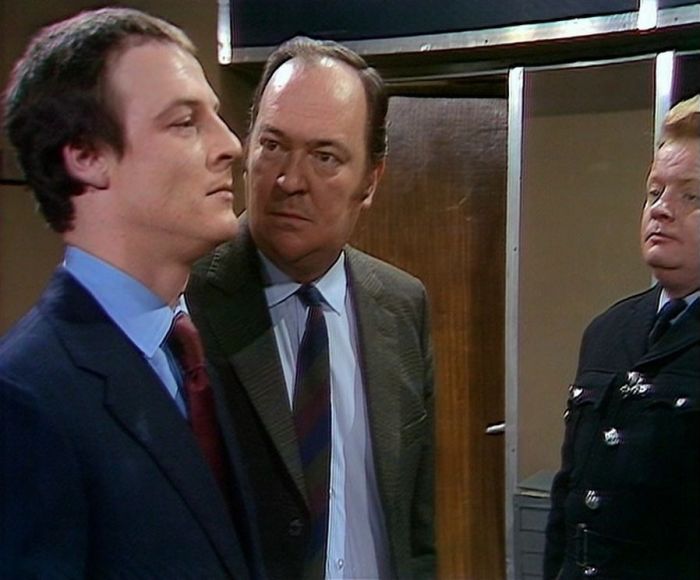
And so we have to bid farewell to Charlie Barlow. The first run of Barlow At Large had preceded series three of Softly Softly: Task Force, but the remainder (three seasons from 1973 onwards) aired after he’d left Thamesford for good.
Poached by the mysterious Fenton (Neil Stacey) from the Home Office, Barlow faces an unknown future. Back then, the viewers wouldn’t have had long to wait to find out what he’d let himself in for (the first episode of the new series was broadcast in February 1973). Today I’ve a feeling we’re in for a far longer wait (Barlow At Large may eventually surface on DVD, but I’m not holding my breath). Fenton would be a regular in the series and thanks to his brief appearance with Cullen here, it’s possible to imagine the sort of combative relationship he and Barlow would later enjoy ….
Run For Your Money is a low-key departure for such an important character. His meeting with Cullen (who buys him lunch at the swanky Stag At Bay restaurant) is delightfully awkward. Barlow then treats Watt and Hawkins to a meal at the same venue later on (if you’ve got the set in the studio then it’s sensible to make the most of it). After he’s broken the news, it’s fair to say there’s conflicted feelings – John Watt has his eye on Barlow’s seat but feels uneasy drinking a toast to celebrate his departure.
Hawkins, as befits his cheery, breezy persona, seems less concerned. It’s an interesting touch that Sara is more ambitious than he is, deciding that Barlow’s departure would mean promotion for everyone.
If the lunchtime meeting between Barlow and Cullen wasn’t awkward enough, the fact that Sara and Hawkins just happened to be noshing in there at the same time added an additional frisson of social embarrassment. Although Sara, as befits her upper-crust breeding, wasn’t at all perturbed. She treats Cullen with amused disrespect and decides that Barlow (out of his earshot) is something of a sad case.
Possibly the most notable thing about The Stag At Bay is that all the waitresses have very low cut tops. Since they’re always bending over the tables this is very noticeable ….
Run For Your Money does have a spot of crime too though. Austin (Ronald Radd) has embezzled twenty thousand pounds from the company he used to work for. A well-spoken, intelligent, middle-aged man, he’s reluctant to reveal where the money is, much to Barlow’s frustration.
Radd’s second and final SS:TF appearance adds a touch of class to the episode. He only appears in a few scenes, but they’re incredibly watchable. The first is a three-hander between Barlow, Evans and Austin. Taking place in the interview room, the sense of claustrophobia is ramped up by the way that the camera keeps tight focus on each of the three in turn. To be honest, I wouldn’t have minded an entire episode just featuring Johns and Radd in the interview room ….
It’s a curious thing, but so many actors back in the sixties and seventies looked a good deal older than they actually were. Radd, for example, was only forty three when he made this episode, but could easily have passed for a man in his late fifties (indeed, Austin states that he’s fifty seven). It would have been interesting to see Barlow break Austin in the interview room, but the mystery of the missing money (there’s a connection to the Vietnam War, which was unexpected) is solved by a spot of good old detective work.
The final shot we have of Barlow is a slow and silent zoom in the interview room (he’d gone back to confront Austin). It’s an unshowy exit for someone who has dominated the series. He’ll be missed.























